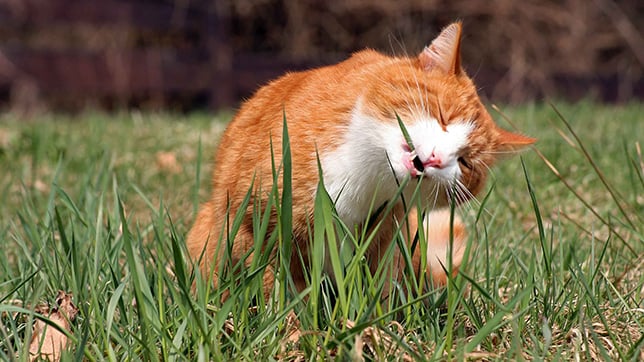Why do cats eat grass?
No matter how much you spend on dishing up the best quality cat food and gourmet treats for your furry friend, it’s not uncommon for pet owners to find their feline chomping on garden grass when they’re free to roam in the great outdoors.
Despite not being the optimum source of food for your pet (and often causing vomiting after it is consumed), grass is not something that’s poisonous to cats. It can even have some benefits on their health, too!
Here are some possible reasons as to why a juicy blade of fresh, green grass may soon become your cat’s favourite daily snack and the signs of possible poor health to look out for:
Grass is a laxative for cats
One of the most common feline behaviours is licking, and depending on the length of hair your cat grows, excess hair can be ingested and block your pet’s digestive tract; causing constipation and discomfort.
Your cat may be eating grass as it serves as a natural laxative to aid the digestive system. It also encourages vomiting, which your cat may use to self-medicate when they swallow inedible items like bones and feathers from their outdoor prey.
It provides nutritional value
Even though grass isn’t recommended by vets as a regular part of a feline’s diet, grass does offer some nutritional benefits.
Folic acid is prominent in grass plants, which is an important vitamin that enables a cat to produce haemoglobin; the iron-rich protein which is pumped around their body to deliver oxygen to tissues. This kind of nutrient is also found in their mother’s milk.
Chlorophyll and vitamins A and D also feature in grass leaves, which can help to boost your cat’s immune system and make them less susceptible to diseases and infection.
It’s tasty!
Along with grass providing cats with extra nutrients, the taste may be the main appetising appeal for your furry friend.
In between meals, cats have been found to graze on grass. Whether it’s stimulating to their palate or just a snack to take them throughout the afternoon, the taste of grass has proven popular!

Is it dangerous for cats to eat grass?
Although eating grass isn’t dangerous to cats, consuming plants that have been chemically treated or fertilised can be harmful. Supervising your cat can be done when they’re in close proximity, but a cat that loves to roam can be much harder to supervise!
Excessive grazing may also indicate a health problem related to your cat’s digestive system. Regularly monitoring the habits of your feline is the best way to check for any abnormalities and if you’re concerned about the amount of grass your cat is eating, it’s best to consult your vet.
Regardless of whether your cat prefers indoor or outdoor grazing, it’s important to make sure that the plants that your pet consumes aren’t harmful.
Looking for more cat advice?
We’ve written some handy cat advice guides, to help you unlock the secrets of your mysterious moggy.
Need cat insurance?
Cat insurance can help cover the cost of veterinary treatment if your cat gets injured or falls ill.
We know pets
Our pets are part of the family. To achieve our vision of a better future for pets everywhere, we work with our partners, vets, and other veterinary professionals who are pioneering the latest advancements in animal care. Our campaigns, articles, and events are crafted to support, educate, and celebrate pet owners, while our policies are designed to provide peace of mind at an affordable price.
Yet our policies don’t just protect against the unexpected – they have purpose, too.
Since we were founded over 25 years ago, we've provided industry-leading policies that protect the nation’s pets, while also making a difference to animal welfare and our planet. Thanks to you, our policyholders, we've donated over £9 million to more than 830 animal welfare charities and conservancies, helping to support vulnerable pets and wildlife around the world.
We’re proud to be wildly different. Are you?
